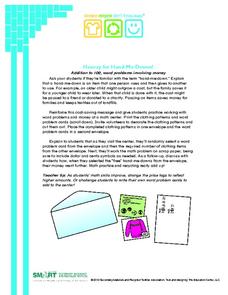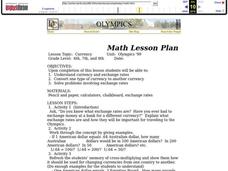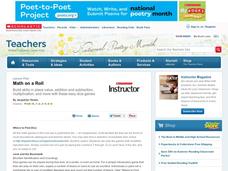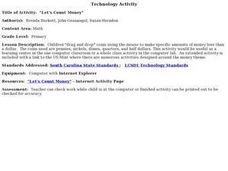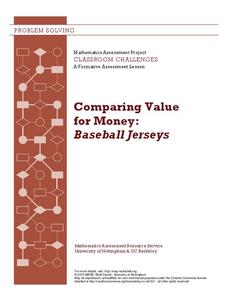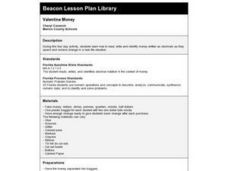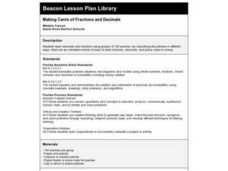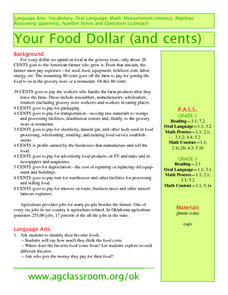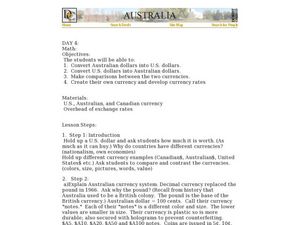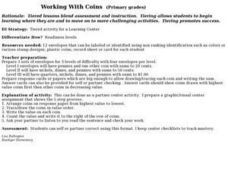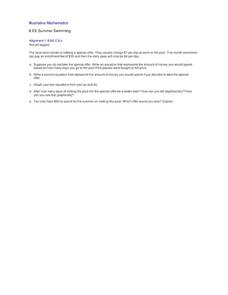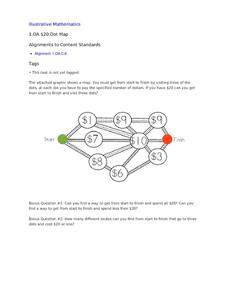Curated OER
Hooray for Hand-Me-Downs!
Youngsters learn how "hand-me-downs" can help save money while practicing math word problems with this fun learning center activity.
Curated OER
Buying a Car
Middle schoolers learn how to manage their money. They view a PowerPoint presentation with instructions for researching and buying a car, select cars for themselves based on their budget, and respond to questions about the activity.
Curated OER
Making Change
Second graders explore how to incorporate a new type of technology, the cash register and/or a calculator, as a motivational tool for solving real life problems. They practice estimating money and counting back change from $20.00.
Curated OER
Currency
Students investigate currency and exchange rates. In the middle school mathematics lesson, students use ratio and proportion to convert from one type of currency to another. Students solve problems involving currency exchange.
Curated OER
Math on a Roll
Students practice various math skills using a polyhedral die. In this dice game lesson, students practice multiplication, addition, place value, and money using games. Standard dice may be used instead of a polyhedral die with...
Curated OER
Currency Exchange
Students investigate the currency exchange rate. In this middle school mathematics lesson plan, student use proportions to exchange between the U.S. dollar and the euro. Students come up with a product they would like to buy and...
Curated OER
"Let's Count Money"
Young scholars participate in an interactive Internet activity that allows them to practice counting money. Students can work independently or cooperatively as they "drag and drop" coins using a mouse.
Curated OER
Comparing Value for Money: Baseball Jerseys
Learners step up to the plate as they first complete an assessment task using linear equations to determine the best company from which to buy baseball jerseys. They then evaluate provided sample responses identifying strengths and...
Curated OER
Understanding the Effects of Currency Exchangerates
Students examine the economic effects of a strong and weak U.S. dollar. They identify the currency used in countries which regularly trade with the U.S., discuss the pros and cons of a strong U.S. dollar, and calculate the prices in...
Curated OER
Valentine Money
Third graders identify money as decimals. They spend and receive change in a real-life situation.
Curated OER
Making Cents of Fractions and Decimals
Students explore decimals and fractions using groups of 100 pennies. By classifying the pennies in different ways, there are an unlimited number of ways to learn fractions, decimals, and place value in money. This is a good, hands-on...
Curated OER
Wants and Needs
Here is an outstanding lesson plan on wants versus needs designed for 1st graders. Pupils listen to the book, Something Good which presents themes on wants, needs, choice, resources, and counting money. Pupils complete worksheets...
Curated OER
The Euro
Students investigate foreign currency. In this secondary mathematics lesson, students explore the reasons why the countries of the European Union switched to the euro. Additionally, students explore the possible reasons why Denmark,...
Curated OER
Your Food Dollar (and Cents)
Young scholars examine where their food dollars go while recognizing coins and making change. They identify their favorite foods, receive one dollar, and take away amounts for each person involved in the production of their food dollar.
Curated OER
Budgeting
Students explore what butgeting means. In this mathematics instructional activity, students determine that certain things need to be part of a budget like food and clothing by answering real-life types of questions on whether one should...
Curated OER
Australian Currency
Students investigate currency and exchange rates. In the middle school mathematics lesson, students use ratio and proportion to convert from Australian currency to the U.S. dollar and vice verse. Students create their own currency and...
Curated OER
Be the Kiwi: Money and Banking
Students practice converting money systems and interest. For this money lesson, students convert U.S. and New Zealand dollars. Students also discuss international travel and money exchange rates.
Curated OER
Working With Coins
Students arrange coins based on their value. In this coins lesson plan, students trace and record the value of each coin. Students count up to find the total value of all the coins.
Utah Education Network (UEN)
Jack and the Beanstalk: Measurement Ideas
Have fun with Jack and his beanstalk! Primary learners will practice skills at various activity centers, including: weight measurement, money, art, nonstandard length measurement, problem solving, music, reading, and writing. Every...
Illustrative Mathematics
Summer Swimming
Here is a real-world application for systems of equations. When is it better to pay an enrollment fee and lower daily rate, and when is it better to pay the regular price? The local swim center is having a special offer, reductions in...
Curated OER
Profit of a Company
Your business executives choose which of three equivalent forms of a quadratic equation is the most useful for finding various pieces of information in this task centered on a company's profits.
EngageNY
The Mathematics Behind a Structured Savings Plan
Make your money work for you. Future economists learn how to apply sigma notation and how to calculate the sum of a finite geometric series. The skill is essential in determining the future value of a structured savings plan with...
Mathematics Assessment Project
Estimating Length Using Scientific Notation
Would you rather have a million dollars or 1 x 10^6 dollars? To find the answer to this question, class members first complete an assessment task converting numbers between decimal notation and scientific notation. They then take part in...
Illustrative Mathematics
$20 Dot Map
Challenge the addition skills of young learners with this open-ended math problem. The task is simple, get from start to finish by connecting a series of three numbers. The trick is that the sum of the numbers must be less than or equal...


